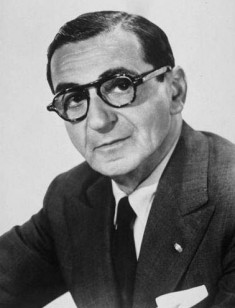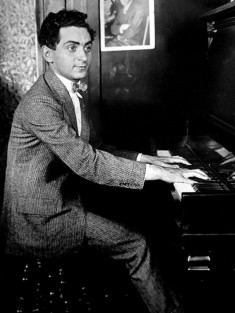| Irving Berlin | |
|---|---|
 |
|
| Composer | |
| Specialty | Lyricist |
| Born | May 11, 1888 |
| Died | Sep. 22, 1989 |
| Nationality | American |
Irving Berlin was a Belarusian-born American composer who wrote around 1,500 songs during his long life. His prolific output of songs, which includes such classics as Alexander’s Ragtime Band and White Christmas, has led him to be considered among the finest of all American songwriters.
Early Years
Berlin, whose birth names were Israel Isadore, was born in a village in Belarus, then part of the Russian Empire, on May 11, 1888. The precise location of his birth is not definitely known, but most authorities believe that he was born close to Mogilyov. Tsar Nicholas II had instituted a brutal anti-Jewish pogrom, and for their own safety, Berlin’s family was forced to leave the country.
They crossed the Atlantic and started a new life in New York City, where Berlin earned money for his family by giving street performances of popular songs of the day. He went on to work as a waiter, again earning tips by singing. No formal education was possible, as his father died when Berlin was just 13 years old.
Beginnings in Music
Although he was unable to read music, Berlin learned how to play the piano and he produced Marie of Sunny Italy, his first published song, in 1907. It was from this time that the name “Irving Berlin” came, the result of a fortuitous error in the sheet music’s printing.
Four years later, he had his breakthrough with Alexander’s Ragtime Band. The tune caused a sensation and a dance craze based on ragtime itself. In 1914, Berlin wrote the score for the revue Watch Your Step, starring Irene and Vernon Castle, who had been instrumental in popularizing the dance craze. Berlin would go on to write for many Broadway musicals, as well as the Ziegfeld Follies.
Professional and Personal Development
 Despite his professional success, Berlin’s personal life had been touched by tragedy: his wife, Dorothy, had died of typhoid after just six months of marriage. He wrote an emotional ballad, I Lost You, in response and it was a great success.
Despite his professional success, Berlin’s personal life had been touched by tragedy: his wife, Dorothy, had died of typhoid after just six months of marriage. He wrote an emotional ballad, I Lost You, in response and it was a great success.
During the years that followed, he wrote further ballads, particularly A Pretty Girl is Like a Melody for the Ziegfeld Follies. In the meantime, the United States had entered World War One, and Berlin was called upon to write patriotic songs for the forces, including the revue Yip Yip Yaphank. When the war ended, Berlin went back to writing for Broadway, including the hit Always, which appeared in 1925.
Always was dedicated to Ellin Mackay, an heiress with whom Berlin had fallen in love. As she was a Roman Catholic, the idea of a marriage with the Jewish Berlin caused something of a scandal in the press, and her father attempted to stop the union taking place. However, in January of 1926, they were married and remained together until Ellin’s death 63 years later.
Berlin’s professional career was also on the rise: Al Jolson performed his Blue Skies in The Jazz Singer, the first feature-length talking picture. His Broadway musicals quickly started to be adapted for the big screen, but after a bad experience with Reaching for the Moon in 1931, he ceased movie work for several years.
Later Career
Berlin’s second chance at movies proved to be more successful, as he produced a string of memorable songs for films such as Top Hat and On the Avenue. In 1942, he worked on the Bing Crosby vehicle Holiday Inn, which included what was to become a perennial holiday classic – White Christmas. The song won an Academy Award.
America was now in World War Two, and as he had done a quarter of a century earlier, Berlin was asked to produce patriotic music for the troops. He gave well-received performances on board ships, often including another of his enduring works, God Bless America. He had actually written the song in 1918, but it was 20 years before it saw the light of day. He assigned royalties to the Boy and Girl Scouts of America.
Berlin even made the occasional personal appearance on film, such as in 1943’s This is the Army – a movie which included God Bless America. After the war, his career began to wind down, and he made no film music after the late 1950s.
Berlin’s Final Years
In 1962, his final Broadway piece, Mr. President, was something of a flop, and he decided to concentrate on the affairs of the music publishing company he ran. President Ronald Reagan awarded him the Medal of Liberty in 1986, and two years later Berlin appeared in public for the final time, at an event held to honor his 100th birthday. He missed his wife badly in the last years of his life, dying in New York on September 22, 1989.
Songs by Berlin topped the U.S. record charts on more than 20 occasions, and have been recorded by a huge range of singers, ranging from Judy Garland to Jerry Garcia. Despite his ability, he never mastered the reading of musical notation.